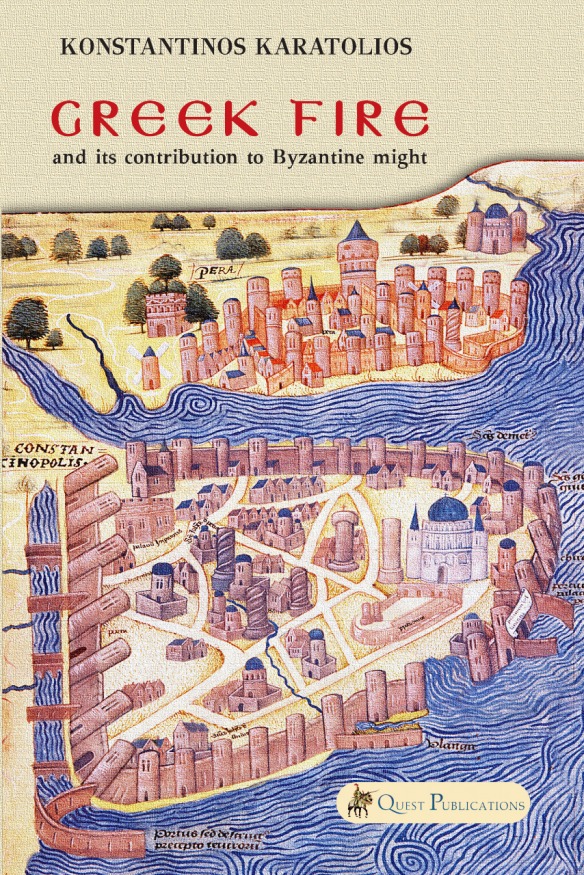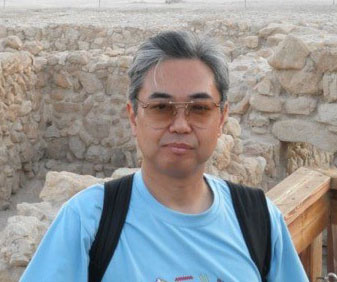
One of my favorite sayings is “Those who fail to learn from history are doomed to repeat it.” Unfortunately, we see such consequences all around us. And it’s no wonder, considering the way they taught history when I was growing up, which was primarily to memorize dates and events without context. Bor-ing!
Quite frankly, I didn’t have much interest in the subject until I started researching my family’s genealogy several years ago. At that point it had meaning, as events at the various time periods affected my progenitors, specifically by precipitating migrations to say nothing of wars. Now that I’ve lived long enough to see a significant number of historical events transpire before my eyes, it’s even more interesting. At this point, I love it, but it’s taken me a lifetime to get there.
Thus, I find it tremendously encouraging to see a young man such as Konstantinos Karatolios embracing history. As you can tell from his name, he’s Greek, and thus hails from a culture with a long and rich history. I have to admit that I thoroughly enjoyed the movie, “Troy”, about the Trojan War and I can easily imagine Konstantinos in the role of Achilles, formerly portrayed by none other than Brad Pitt. If Konstantinos goes into teaching after completing his PhD, I’ll bet dollars to donuts he’s going to have a powerful affect on increasing interest in the subject, kind of like Indiana Jones did on archaeology. 😉
So without further ado, let’s learn some more about this good-looking guy who’s intelligent enough to realize what a treasure trove history is , long before he’s as old as dirt like myself, and discover his motivation to write “Greek Fire,” from which you can find an excerpt below the interview.
You can learn more about Konstantinos here as well as his website and connect via his Facebook page.
MF: Few civilizations have a history as rich as Greece. Which time period do you find most interesting?
KK: There is no doubt that there is a focus on the Classical Period and I truly understand the popularity of this era. However I think that if you scratch the surface you will find that other periods are very interesting as well. One of these is definitely the Mycenaean era. Despite all that I chose to write about the most ambiguous period of all. The medieval period, i.e. the Byzantine when we are talking about the East. It is definitely the least appreciated of all but it promises some of the biggest thrills to those who bother study it.
MF: Who do you think is the most fascinating person in Greek history?
KK: That’s a really tough question. However it is my opinion that it’s not the charismatic leaders that make the important era but it is a significant era that calls for a charismatic leader. The same applies for artists and scientists too. What would Mozart have been if it wasn’t the historical period he was born at?
MF: How much truth to you think exists in Greek myths? Do you think they’re true stories embellished with time or purely symbolic?
KK: I think that myths are myths and we shouldn’t take them as facts. However no story is made without having a historical core. Difficult as it is our job is to find that core and see how it correlates with history.
MF: Was there something specific that drew your interest to Greek Fire?
KK: Greek Fire is covered in vagueness. It’s not only the fact that the way it was made was a state secret. Byzantines knew how important it was to possess a weapon that the opponents didn’t knew what it was and indeed we know that there were cases when armies surrendered just hearing that the Byzantines had it. So we have a weapon mentioned in a lot of sources but with a way that it doesn’t help us historians to draw definite conclusions. On the other hand the modern opinion of Greek Fire is oversimplified and totally unacceptable. The combination of these too made me interested in Greek Fire.
MF: Did you have any interesting experiences while researching your book?
KK: Researching is always an interesting experience by itself. All these little disappointments when you find out that things were not as you expected them to be on the one hand but also the huge satisfaction you get when you discover something new, is something difficult to describe.
MF: What’s the biggest challenge you found researching historical events?
KK: The biggest problem for a Byzantinologist is definitely the lack of sources. In many cases we must make the most with almost nothing.
MF: If you had access to a time machine, when and where would you want to go?
KK: It goes without saying that I would travel to the Byzantine Empire. I truly hope that they wouldn’t burn my time machine down using Greek Fire! It would be highly ironic!
MF: What is your favorite place to go when you’re seeking some inspiration?
KK: The ideal place for a writer is somewhere where he or she can be totally isolated from other people and not distracted at all. I have to admit that this is too good to be true. Usually I just lock myself up in my office but that’s never as isolated as it sounds!
MF: What are you currently working on?
KK: I’m working on my PhD. I try to find out everything there is for the education of the princes of the Macedonian Dynasty, at the Middle Byzantine Era. I am looking to return to Greek Fire as soon as I get the chance to do it.

Excerpt:
“The wonder of the thousand-year Byzantine Empire could not have been achieved without an army that allowed it to maintain its existence for so many centuries. This was despite facing constant challenges from external enemies that differed significantly in their nature. In this context, what had been inherited from the Romans and the adoption of new weapons and tactics in battle were of equal importance. “Greek fire”, if not the most important of these weapons, was surely that which achieved the greatest fame of all. It was used throughout the course of the Byzantine Empire and granted resounding victories to its navy. Its use verges on legend, and yet almost all we know about it and its use is clouded by the vagueness of the primary sources.”
You can learn more about “Greek Fire” at the publisher’s site and pick up your copy from Amazon here.


 CB: WWII caught Britain by surprise in some respects. The fall of Singapore, for example, suggests that they really had little intelligence on the “strength” or “state” of their empire. It was simply the leadership of Winston Churchill that gave the British people the moral resolve to withstand the Nazi threat in 1940-41 and the budding friendship of Churchill and U.S. President Franklin Roosevelt known as the “special relationship.” Churchill was willing to make many compromises in terms of relinquishing colonies, and, as a former Colonial Secretary, was more even-handed in his approach to the colonies. However, the shock of losing the empire after 1945 and the rise of self-determination brought a tough decision on how to move forward. The British had lost their preeminent position of the Victorian Age and, now with the rise of the United States as the world superpower, a new balance-of-power had been thrust upon Great Britain. Churchill’s prescience and a concern for home and social matters helped to ease the transition of Britain from a recognized world power to that of a secondary role.
CB: WWII caught Britain by surprise in some respects. The fall of Singapore, for example, suggests that they really had little intelligence on the “strength” or “state” of their empire. It was simply the leadership of Winston Churchill that gave the British people the moral resolve to withstand the Nazi threat in 1940-41 and the budding friendship of Churchill and U.S. President Franklin Roosevelt known as the “special relationship.” Churchill was willing to make many compromises in terms of relinquishing colonies, and, as a former Colonial Secretary, was more even-handed in his approach to the colonies. However, the shock of losing the empire after 1945 and the rise of self-determination brought a tough decision on how to move forward. The British had lost their preeminent position of the Victorian Age and, now with the rise of the United States as the world superpower, a new balance-of-power had been thrust upon Great Britain. Churchill’s prescience and a concern for home and social matters helped to ease the transition of Britain from a recognized world power to that of a secondary role.

 MF: What are you finding in your current research into Syriac Christianity and its spread into Persia that relates to modern tensions between Christians and Muslims?
MF: What are you finding in your current research into Syriac Christianity and its spread into Persia that relates to modern tensions between Christians and Muslims?